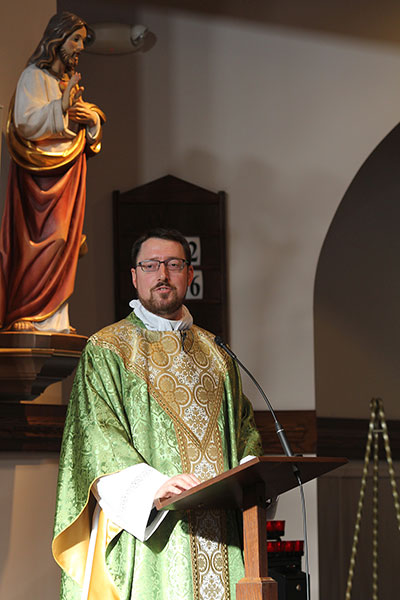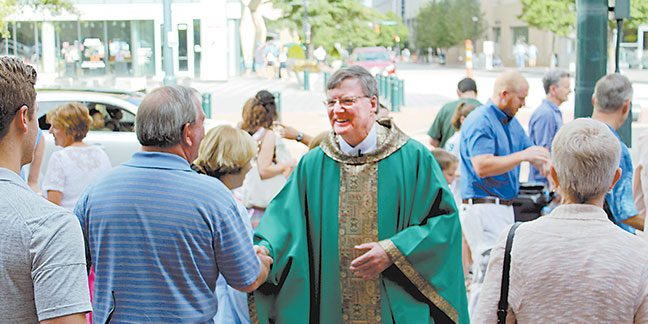 GASTONIA — It’s been a decade since Father Lucas Rossi, pastor of St. Michael Church, knelt before Bishop Peter Jugis and was ordained a priest.
GASTONIA — It’s been a decade since Father Lucas Rossi, pastor of St. Michael Church, knelt before Bishop Peter Jugis and was ordained a priest.
Since that day in 2010, Father Rossi’s vocation has taken him from churches in Winston-Salem to Charlotte to Salisbury, in addition to a brief time discerning a monastic vocation with the Benedictines at Belmont Abbey. In 2018, Bishop Jugis assigned him to serve as pastor of St. Michael Church in Gastonia. He has embraced the ups and downs of ministry, most recently leading St. Michael Parish’s efforts to replace a leaky church roof, strengthening parish life and ministries, and embarking on a revitalization of St. Michael School.
“It’s wonderful serving as pastor. I am very happy to be at a parish with a parish school,” he says. “The families are wonderful, holy and supportive people.”
One of the greatest challenges, he says, has been his separation from parishioners after public Masses were not able to be celebrated during the COVID-19 pandemic. Not being able to offer Holy Communion to the faithful during Mass in the early weeks of the shutdown was difficult.
“That was horrible,” he recalls. “As we have opened up and people have come back, we are encouraging precautions. And we are also livestreaming the Sunday 9 a.m. Mass for those who can’t be with us.”
He has come to learn that a successful pastor is one who promotes unity with his parishioners and has a heart open to listening to them, encouraging them, and leading them according to Christ’s example. He has embraced this lesson in his own ministry. “It is important to listen to the counsel that the parish leaders offer the pastor. It is important to collaborate with parishioners in leadership, as they offer you their expertise and advice, and it is important to have the support and prayers of the faithful,” he says. “I have come to rely very much on that support and prayer.”
Daily prayer in the presence of the Blessed Sacrament, confession, and fraternity with brother priests have also been sources of strength for him, he says.
“I think that as we are spiritual fathers for the people and we preach about prayer, we have to embrace prayer and a fruitful sacramental life ourselves – first and foremost. We have to be living it. That is an important lesson.”
His advice to men discerning the priesthood? “Develop a deep love for Our Lady and for Jesus in the Eucharist, in Adoration. If that’s not there, you will probably not hear the voice of the Lord. Turn from sin, root it out with regular confession so you can remove the obstacles of sin, which prevents you from hearing God’s voice.”
He points out that every young man is called to be holy. The vocation is the pathway to holiness – be it priesthood, religious life, married life or committed single life. “Every man is called to share in some way in the fatherhood of the Heavenly Father. A man committed to holiness does not mean he will automatically become a priest. A man seeking holiness will be led by God to a particular vocation.”
“Universally, we can look at St. Joseph, who embraced holiness in married life and chastity,” he adds. “Devote your life to Mary and Jesus, serve them in every way possible in your vocation. That is the path to holiness.”
— SueAnn Howell, Senior reporter
Grateful for the priesthood
 CHARLOTTE — The mission of the Society of Jesus, popularly known as the Jesuits, was captivating to the teenaged Jim Shea. More than 50 years onward, Father Shea is celebrating his 45th anniversary of priestly ministry, where he now serves as pastor of St. Peter Church in Charlotte.
CHARLOTTE — The mission of the Society of Jesus, popularly known as the Jesuits, was captivating to the teenaged Jim Shea. More than 50 years onward, Father Shea is celebrating his 45th anniversary of priestly ministry, where he now serves as pastor of St. Peter Church in Charlotte.
Father Shea grew up in Waterbury, Conn., to Irish Catholic parents. “It was pretty natural at that time of thinking about being a priest,” he said. “I thought I might be a lawyer like my father, or a doctor like my uncle, or a priest.”
He attended public schools growing up but was attracted to the Jesuits when he began eyeing Catholic colleges in the early 1960s. He joined the Jesuits right out of high school.
“I thought to give it a try, and they let me give it a try, and I stayed,” he recalls with a smile.
His period of formation was 11 years, culminating in his ordination by Worcester Bishop Bernard Joseph Flanagan on June 2, 1975, at the College of the Holy Cross.
Over those 11 years, Father Shea had varied experiences that affected his vocation.
“During the two-year novitiate, you learn how to pray. It tests you, to make you trust in God and push you out of your comfort zone,” he explains.
Father Shea studied at Boston College, then taught for two years.
After his ordination on June 7, 1975, he was assigned to a parish in Texas, during which time he earned his doctorate in pastoral counseling at Southern Methodist University in Dallas.
“I enjoyed working in medical centers, serving as a chaplain but also as an educator. I ran programs to train seminarians, sisters and priests,” he says.
He taught in the field of clinical pastoral education for 25 years, including 15 years at Georgetown University in Washington, D.C., where he also served at the medical center.
“A lot of seminaries sent their students to me for summer assignments,” he says. “You can learn so much in the hospital. It’s holy ground. People learn how to minister, how to be with people when they are suffering. They learn not to be afraid, not to run away.”
He also served as pastor of Holy Trinity Parish adjacent to Georgetown University, then went on to serve as the head, or provincial, of the Jesuits’ Maryland Province. Over the next six years he traveled throughout the province visiting the Jesuit-run parishes in the South, including St. Therese Church in Mooresville and St. Peter Church.
“That is how I met Bishop Peter Jugis,” he explains.
Five years ago, the new provincial approached Father Shea about serving at St. Peter Church.
His return to parish ministry has been rewarding after years in leadership, he notes – even with the challenges presented by the COVID-19 pandemic.
“These are tough days,” he acknowledges, but adds, “I am especially grateful (for my vocation) and I feel it is a great privilege these days. With all the division in the world, in a special way people need the consolation of the Gospel.”
He says that “it is a great privilege to preach. I am grateful for that as we try to figure out how to stay close to people in isolation.”
“As a priest, you only get better with time. If you keep growing, you only get better because you are freer, you are wiser. You are more available to people. The longer you live, the more you can talk about how faithful God is. The older you are, the more you look back on your life and see that as in Romans 8:28: ‘in all things God works for the good of all those who love Him.’ As you get older you can speak authentically about that.”
People are in great need of God during these times, he notes. “They are hungry for a relationship with Christ. There is so much interest in spirituality.”
The spirituality of the Jesuits is perfectly suited to times such as these, he says. “St. Ignatius talks about finding God in your experiences.”
As he reflects on his five decades as a Jesuit, Father Shea says, “I have been a Jesuit most of my life, and I am honestly grateful. I would do it again.”
— SueAnn Howell, Senior reporter

